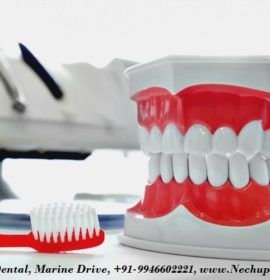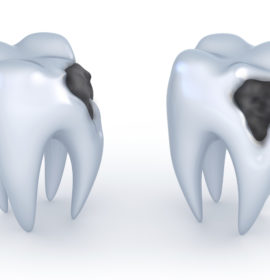
Cavities
crowns . Dental Problem . Dental tips
What are cavities?
A cavity, also called tooth decay, is a hole that forms in your tooth. Cavities start small and gradually become bigger when they’re left untreated. Because many cavities don’t cause pain in the beginning, it can be hard to realize that a problem exists. Regular dental appointments can detect tooth decay early.
Cavities and tooth decay are some of the most common health problems in the world. Anyone with teeth can develop cavities, including babies.
Finding out that you have a cavity might come as a surprise. This is especially true if you think you have a good oral hygiene routine. However, even if your dentist delivers this news, there are ways to treat a cavity and prevent new ones from forming.
Symptoms of tooth cavities
The symptoms of a cavity depend on the severity of the decay. They include:
tooth sensitivity
tooth pain
a visible hole in your teeth
black or white staining on your teeth
Causes of tooth cavities
Tooth cavities are caused by plaque, a sticky substance that binds to teeth. Plaque is a combination of:
bacteria
saliva
acid
food particles
Everyone has bacteria in their mouth. After eating or drinking foods with sugar, bacteria in your mouth turn sugar into acid. Plaque starts forming on your teeth soon after eating or drinking anything sugary. This is why regular brushing is important.
Plaque sticks to your teeth, and the acid in plaque can slowly erode tooth enamel. Enamel is a hard, protective coating on your teeth that protects against tooth decay. As your tooth enamel weakens, the risk for decay increases.
Everyone is at risk for cavities, but some people have a higher risk. Risk factors include:
too many sugary or acidic foods and drinks
a poor oral hygiene routine, such as failing to brush or floss daily
not getting enough fluoride
dry mouth
eating disorders, such as anorexia and bulimia
acid reflux disease, which can result in stomach acid wearing down your tooth enamel
Cavities develop more often in the back teeth, according to the Mayo Clinic. These teeth have grooves and openings that can trap food particles. Also, these teeth are sometimes harder to reach when brushing and flossing.
Treatment options for tooth cavities
Tell your doctor about uncomfortable symptoms like tooth sensitivity or pain. Your dentist can identify tooth decay after an oral exam. However, some cavities aren’t visible from an oral exam. So your dentist may use a dental X-ray to look for decay.
Treatment options
Treatment options depend on severity. There are several ways to treat a cavity.
Tooth fillings
A dentist uses a drill and removes decayed material from a tooth. The dentist then fills your tooth with a substance, such as silver, gold, or composite resin. We at Nechupadam Dental Clinic use metal free, zinc free, mercury free, aestheitic/ tooth content fillings
Crowns
For more severe decay,we place a custom-fit cap over your tooth to replace its natural crown. The Doctor will remove decayed tooth material before starting this procedure.
Root canal
When tooth decay causes the death of your nerves, your dentist will perform a root canal to save your tooth. They remove the nerve tissue, blood vessel tissues, and any decayed areas of your tooth. The dentist then checks for infections and applies medication to the roots as needed. Finally, they fill the tooth, and they might even place a crown on it.
Early stage treatment
If the dentist detects a tooth cavity in its early stage, a fluoride treatment may restore your tooth enamel and prevent further decay.
Dealing with pain
Cavities and tooth decay can be the cause of a lot of pain and discomfort. You may want to find ways to soothe irritation while you wait for your dentist appointment. There are a few things you can do to deal with discomfort temporarily:
Keep up your oral hygiene routine. Continue to brush and clean all parts of your mouth, including any sensitive areas.
Watch what you eat. Stay away from extremely hot or cold foods when eating or drinking.
Complications from tooth cavities
A tooth cavity can cause a variety of complications if it’s left untreated. These include:
* ongoing tooth pain
* a tooth abscess, which can become infected and trigger life-threatening complications, like an infection that enters the bloodstream or sepsis
* the development of pus around the infected tooth
* an increased risk for breaking or chipping a tooth
* difficulty chewing food
You may cause damage to your tooth that can’t be reversed if you put off seeing a dentist. At this point, the only way to fix the cavity is for your dentist to remove the tooth and replace it with an implant or bridge.
Preventing tooth cavities
Tooth cavities are a common dental problem, but you can reduce your risk by doing the following:
*Brush your teeth at least twice per day with a fluoride toothpaste.
*Floss at least once daily, as recommended by the American Dental Association.
*Eat fewer sugary and acidic foods, like sweets, candy, juice, soda, and refined carbohydrates.
*Limit snacking between meals.
*Consider getting dental sealants on your teeth.
The following foods can help fight tooth decay:
fiber-rich fruits and vegetables
calcium-rich foods
xylitol sugarless chewing gum
unsweetened black or green tea
water with fluoride
Also, don’t forget to visit the dentist at least twice per year for regular teeth cleanings. Visit the expert Orthodontist Dr.Thomas Nechupadam, at GCDA, Marine Drive, Kochi and consult your problem it will help prevent future dental problems.





